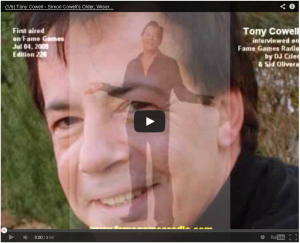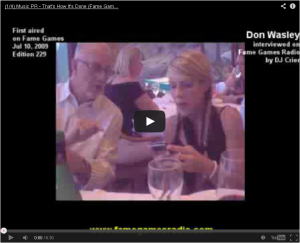
This chapter is more personal. But I felt that giving you a little background for how the idea of this course took shape is important for you to “totally get” where we’re going and why. Chances are, you will recognize yourself in my past experiences and my subsequent recommendations might thus make that much more sense for you.
Ever since I was a kid in then-Iron-Curtain Poland, I wanted to do music for a living. Later, as a youngster growing up in New York, I actively pursued all kinds of musical activities and even won a talent contest or two. I had my first offer of a record contract when I was 17 and but my parents came down on me like a ton of bricks, insisting that I finish my schooling first. In my early 20’s, when I moved to Denmark for some time, I had a #1 airplay hit in a few countries with a band of mine (Prince Scandal, “September Song”) while I was still at university and working an increasingly-time-consuming day job in which I was constantly advancing in position, pay and responsibilities. At one point I became the I.T. boss of a large multinational company… but that’s a whole different story.
By then, I was already too distracted and not working full time on music, because I had to support myself, and then soon after that, a family. My dream of living off music was quickly fading until at one point I almost stopped. There just was no time for it. I did maybe a couple of hours each late-late night and that was that.
But then, through a series of weird coincidences, I started producing radio jingles in my spare time. I was now living in Southern Spain. You just can’t beat the weather in this place! Initially I just gave these jingles to a local DJ for free, but soon I had requests from various other stations to do some for them as well. I made some money on that, but not nearly enough to ditch my main income source. My company (I was building and programming computers at the time) was still my overriding priority.
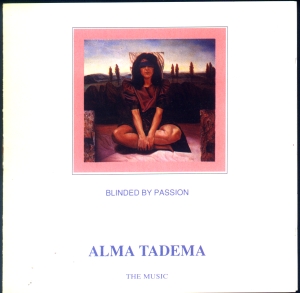 Then, some computer clients of mine got to talking with me and we decided to “do some music” during the weekends. I produced a whole album for them and wrote about half of it by myself (Alma Tadema, “Blinded By Passion”). Then we went ahead and started promoting it – very ineptly, as you might imagine.
Then, some computer clients of mine got to talking with me and we decided to “do some music” during the weekends. I produced a whole album for them and wrote about half of it by myself (Alma Tadema, “Blinded By Passion”). Then we went ahead and started promoting it – very ineptly, as you might imagine.
The record seemed to go nowhere at first. It was a kind of a weirdish New-Age-Rock fusion and there didn’t’ seem to be any market for it. Until… one day we got word that the music “somehow” got picked up by the Barcelona Olympics music department and… it was used extensively to promote the ’92 Games in Spain, South America and a few other places too!
 I won’t bore you with all the details, but suffice it to say that on the strength of that I got offered a songwriting and production gig for a retired, formerly multi-million-selling artist (Kimera) who wanted to make a comeback! I got that gig through one of those radio-jingle contacts I made earlier. And now I was finally able to make music full time.
I won’t bore you with all the details, but suffice it to say that on the strength of that I got offered a songwriting and production gig for a retired, formerly multi-million-selling artist (Kimera) who wanted to make a comeback! I got that gig through one of those radio-jingle contacts I made earlier. And now I was finally able to make music full time.
As it happened, due to the global financial crisis at the time, my computer company went out of business as creditors who owed us millions of dollars folded one after another. I could have chosen to sue them and fight on – or fold as well. So with my music dream suddenly reawakened, I decided to follow it as far as it would take me.
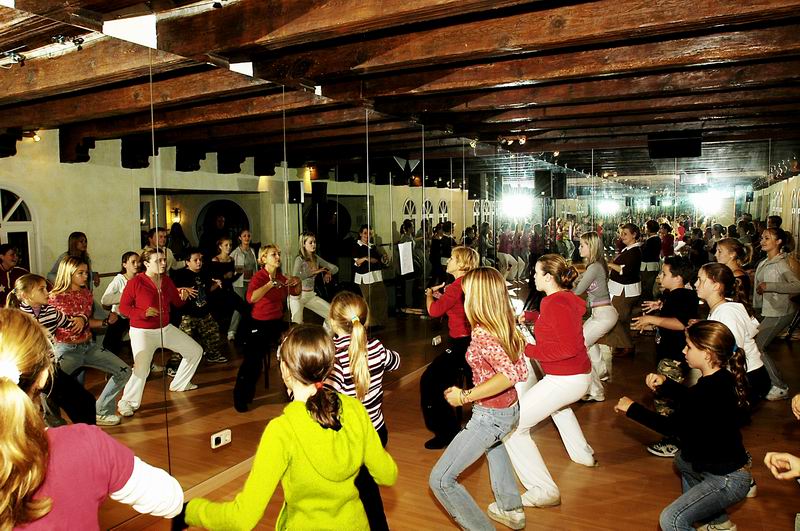 While I totally failed with my Kimera album project for reasons too complex to get into here, including primarily my own insufficient experience, I managed to start opening many doors, and got involved in various labels, managements or music production companies. I started producing artists and writing songs for them, basically beginning to “live the dream”, even though my incomes were very low at the time. But – I was indeed now living exclusively off music. And I also increasingly wanted to help all these fabulous artists I was working with, seeing their failure as incomprehensible.
While I totally failed with my Kimera album project for reasons too complex to get into here, including primarily my own insufficient experience, I managed to start opening many doors, and got involved in various labels, managements or music production companies. I started producing artists and writing songs for them, basically beginning to “live the dream”, even though my incomes were very low at the time. But – I was indeed now living exclusively off music. And I also increasingly wanted to help all these fabulous artists I was working with, seeing their failure as incomprehensible.
“How could SUCH talents be going to waste!”
So I did my best to “network” with the “big boys” as much as possible, in order to maximize my own and my artists’ chances. And even though I’ve had some minor causes for celebration along the way, the whole game was impossibly difficult to play, never mind win. And I even had a backer or two come join me along the way.
During my work on the “inside” of the music business, with various labels, managements and production companies, I met and worked with lots of truly brilliant people, some already famous, some soon-to-be famous, some forever “unknown”. I’ve also casually met dozens more established artists, engineers, producers, managers, music lawyers, music moguls and so on. On the naive default assumption that it’s “who you know”, it looked to me like I’ve finally “made it” and “cashing in” on all that seemed like just a matter of time.
 But even the most “plugged-in” people I knew had a hard time. One of the artists I briefly worked with was the then-19-year-old Robin Thicke whose whole family was top-shelf show-business, and who was plugged in to the hilt, and was already writing songs for many then-top international acts – but who wound up spending another 10 years or more before finally cracking the mainstream. And most of the others, equally good, never made it – with equally powerful connections and great music to boot.
But even the most “plugged-in” people I knew had a hard time. One of the artists I briefly worked with was the then-19-year-old Robin Thicke whose whole family was top-shelf show-business, and who was plugged in to the hilt, and was already writing songs for many then-top international acts – but who wound up spending another 10 years or more before finally cracking the mainstream. And most of the others, equally good, never made it – with equally powerful connections and great music to boot.
So, I knew things weren’t going to be “easy”. But I was in it because I loved it. Ultimately, I just wanted to be able to “survive” while doing what I loved.
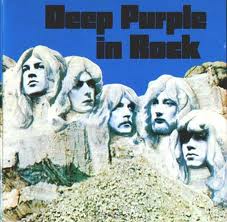 But the music business was already changing beyond recognition. What I knew of it was old hat. For that matter, even many of the superstar experienced people I worked with were equally old hat!
But the music business was already changing beyond recognition. What I knew of it was old hat. For that matter, even many of the superstar experienced people I worked with were equally old hat!
My partner in one of my music ventures was the famed manager John Coletta (RIP) who founded and managed Deep Purple, later Whitesnake, Michael Schenker Group and lots of others. Another partner was Derek Lawrence who produced Deep Purple, Wishbone Ash, Hot Chocolate and scores of others. Yet even their 300,000,000-plus combined record sales weren’t enough to plug us back in! They wanted the business to continue working like it used to – not like it actually did.
But thanks to this and other similar liaisons I’ve formed, I had a chance to work with top people in the music business, some of whom went on to win Grammies, others to become household names – while my own artistic career stalled. It wasn’t the quality of my music, I dare say. It was the quality of my organization. Or lack of it. Or rather, lack of knowing what and how to do “today”. All the music I produced as well as all the music we handled as a company was the right quality. There’s no question about it. But we didn’t manage to plug it correctly. Foolishly, we regularly ignored channels which we thought were “beneath” us!
 One of my writing partners for many years was Rob Davis. Even though he had a string of hits as a young man with his 80’s glam-rock group, Mud (remember “Tiger Feet”?), he failed to repeat his success afterwards and eventually wound up collaborating with my and John’s team, cranking out song after song, working with me on developing artists, and so on. And nothing happened. John’s old channels still didn’t bear any fruits for us.
One of my writing partners for many years was Rob Davis. Even though he had a string of hits as a young man with his 80’s glam-rock group, Mud (remember “Tiger Feet”?), he failed to repeat his success afterwards and eventually wound up collaborating with my and John’s team, cranking out song after song, working with me on developing artists, and so on. And nothing happened. John’s old channels still didn’t bear any fruits for us.
But then through a completely unrelated channel, Rob got to write some “toplines” (melody and lyrics, but not the arrangement) over an instrumental dance track which was already doing pretty well in London clubs at the time and… out of the blue he scored a #1 hit with “Toca’s Miracle” – and sold over half a million records in the process. Soon afterwards, he wrote toplines for another club hit and sold over two million records (“If This Ain’t Love (Why Does It Feel So Good)”). And then everybody wanted his songs. He co-wrote Kylie Minogue’s “Can’t Get You Out of My Head” (I was one of the first to listen and critique its pre-release  version) and scores of other multi-million selling hits. He now even started selling his formerly-rejected songs. All of that happened through NEW, “unusual” channels which the “old guard” would never have embraced. Us metal-heads were supposed to loathe dance after all. So, looked like there was hope for me yet!
version) and scores of other multi-million selling hits. He now even started selling his formerly-rejected songs. All of that happened through NEW, “unusual” channels which the “old guard” would never have embraced. Us metal-heads were supposed to loathe dance after all. So, looked like there was hope for me yet!
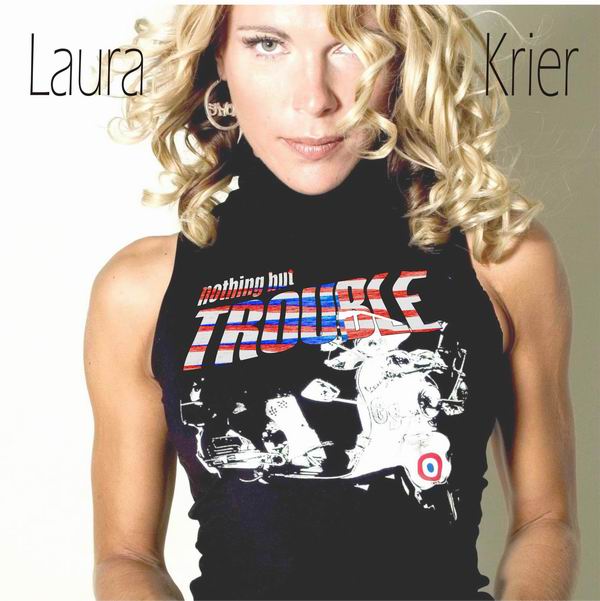 So now I knew that it “could be done”. “We” – broadly speaking – have done it already! Grammies, millions in sales. Let’s do it again. Unfortunately, we continued following models which were “comfortable” to us and our ways of thinking.
So now I knew that it “could be done”. “We” – broadly speaking – have done it already! Grammies, millions in sales. Let’s do it again. Unfortunately, we continued following models which were “comfortable” to us and our ways of thinking.
Meanwhile, our growing stable of world-class indie artists was still going nowhere.
Then, at one point, together with my partner and fabulous singer, Laura Krier, whom we’ve signed on to our production company at the time, and for whom John managed to sign a few record and publishing deals – just before he sadly died (and the deals with him…), we decided to build a promotional platform for all these lost musical souls, together with a bunch of like-minded music industry friends.
“Fill Me Up” – [audio:https://meermusic.com/ps/Laura%20Krier%20-%20Fill%20Me%20Up%20(FinalMix%2001).mp3] * “You Got Me” – [audio:https://meermusic.com/ps/Laura%20Krier%20-%20You%20Got%20Me%20(FinalMix%2001).mp3]
We called it “Fame Games Radio”. It was an independent music showcase radio show and (later) podcast, which in a matter of months grew from zero to half a million online listeners, then a million, then finally to over six! The quality of music submitted to us was simply off the charts. In the process we got syndicated by ABC Radio Networks and, for a while, we were looking at potential millions of terrestrial listeners all across the States. Before long we were picking up affiliates (local radio stations) all over the world – from the UK to Australia to Spain.
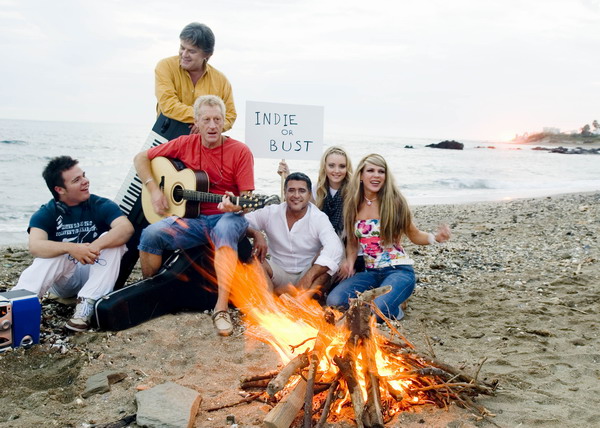 For a moment it really seemed like Fame Games would become the answer to all the independent musicians’ (“indies”) prayers. A chance to get “discovered” by major labels through Fame Games, along with lots of airplay, thousands of new fans, all that. What could be better! And best of all – it would all be fair and square, as voted by online listeners, simply through airplay on merit.
For a moment it really seemed like Fame Games would become the answer to all the independent musicians’ (“indies”) prayers. A chance to get “discovered” by major labels through Fame Games, along with lots of airplay, thousands of new fans, all that. What could be better! And best of all – it would all be fair and square, as voted by online listeners, simply through airplay on merit.
We promoted ALL kinds of music. From out-and-out pop to acid jazz, from country to R&B, from folk to neo-classical, from hip-hop to electronica. It just had to be GOOD. We loved all of it! And so did some seemingly “pop only” music moguls. We got a major boost to our “industry credibility” when new powerful players started joining us to help us make our dream become a reality. Simon Cowell’s older brother, Tony, became a permanent fixture on the show, as did the famed music promoter Don Wasley who launched the careers of KISS, Cher, Lynyrd Skynrd, Donna Summer and many more, and a number of others of that caliber (Don later switched from show business to shoe business, helping bring such companies as Skechers or LA Gear to prominence). Old-guard artists such as Lionel Ritchie or new-stars such as Shontelle also lent their support and endorsed us in a big way.
It really looked like Fame Games was going to become the new music revolution. But right from the start we were up against stiff opposition. The ABC radio affiliates were complaining that the show was “too racy” and had too much “unknown music” and too many non-American accents! And too many musical styles. And way too many indies. That was the point, wasn’t it?
Never mind that the music was not merely world class – it was “better” than anything the major labels were putting out. And it was grass roots. Made in people’s bedrooms. Wasn’t that something NEW and worthwhile? And all those super-talented people were barely making ends meet, certainly not making anything off their music – they DESERVED a break! And we were determined to provide it for them.
And then the 2008 global crash came and soon all our affiliates started cutting back and playing it safe. 300 affiliates became 40, then 10 – then none. ABC filed Chapter 11. And our backers got cold feet. Sure, we could hang around and hope to get some money out of it eventually – or we could just cut our losses. Our backers chose the latter.
Suddenly, from one day to the next we found ourselves footloose and fancy free. Broke.
The impact of this failure was very heavy for me, personally. I made a colossal mistake by not securing ourselves with a “plan B”. And now I was broke as I’d ever been, with a growing family in tow. It was time for a major rethink of my life. But it needed to be something pretty good. And it needed to work fast.
Long story short, with a proverbial gun to my head I frantically embarked on an all-out effort to re-educate myself. Initially, I tried reviving my musical promotions on the Web, but as I soon discovered, I just didn’t know enough about how to do that. This soon lead me to more general online marketing, and that, as it turned out, was also much more complicated and difficult than I ever expected. Before I knew it, I was taking marketing courses, and falling for every one of the endless Internet “make money quick” schemes. Meanwhile, time was running out, financial pressures becoming almost more than anyone could bear. After a lifetime of entrepreneurship and being my own boss, I suddenly had to consider working for someone else once again. At one point I would have taken “any” job going. But none were going.
And so I found myself in a situation where – largely due to the still-ongoing global crisis – I could find no paying clients for my music services (I still lived in Spain, in an area where there just wasn’t enough demand for what I do), no meaningful incomes from my computer expertise and basically no means of “proper” sustenance. I had barely enough money to eat, never mind investing in a new business. Talk about helter-skelter. One moment on top of the world, the next moment in the gutter. Laura had to do low-level pub gigs and music teaching just to bring at least some incomes in, but even that was really tough in a severely depressed market. So, the Internet was all I had left, as long as I could somehow manage to pay for electricity and a roof over my head. So, it was do or die.
Happily, as this book loosely proves, I didn’t die.
But it took me nearly two years before I finally managed to pick myself back up by my bootstraps, while Laura embraced her new vocation, teaching music… It seems I needed to first do everything wrong before I finally understood how to do things the right way.
As things finally started settling down, my internet-based clients and sites finally beginning to produce some results, I once again started considering re-launching Fame Games, or something along those lines. To this day, nearly four years after Fame Games Radio closed down, I still get submissions and fan mails asking when we’re going to be back!
So, at length, I decided to write this book first. The indies need some guidance and help as much today as ever. Re-launching Fame Games will remain on the table for a little later – and very much subject to your feedback.
So consider this whole course as a kind of a prequel to Fame Games 2.0. And I sincerely hope it will help you avoid the same pitfalls I fell into and also help you build a music career for yourself faster than I was able. Had I known then what I know now, things would have been entirely different. But now – YOU can have all these tools to use for your own career.
Oh and one more thing. In keeping with the mission of this book to teach you how to generate online incomes with your music – and not only with your music – I’ll offer you a chance to earn easy, passive income on this course! Simply sign up as an affiliate for it and promote it to everyone you know! This way more musicians will discover how they can improve their online lot, and you’ll have some passive income! Makes sense?
OK. And now, let’s start getting into the nitty-gritty.
 |
 |
 |
| Book 1 – Chapter 02 Foreword |
Course Overview | Book 1 – Chapter 04 Indie or Record Deal? |
Book 1: 1, 2, 3, 4, 5, 6, 7, 8, 9, 10, 11, 12, 13, 14, 15, 16, 17, Overview

